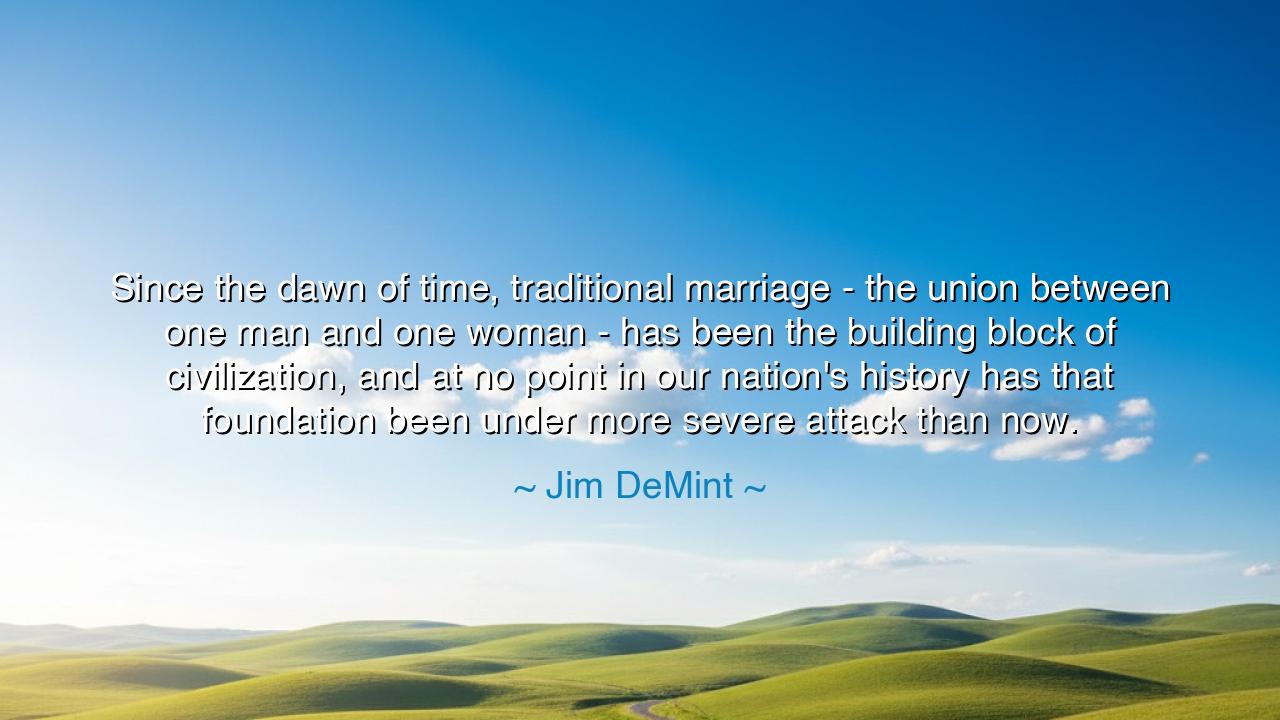
Since the dawn of time, traditional marriage - the union between
Since the dawn of time, traditional marriage - the union between one man and one woman - has been the building block of civilization, and at no point in our nation's history has that foundation been under more severe attack than now.






“Since the dawn of time, traditional marriage — the union between one man and one woman — has been the building block of civilization, and at no point in our nation’s history has that foundation been under more severe attack than now.” Thus spoke Jim DeMint, the American statesman, whose words rise not merely as argument, but as a cry of warning — a call to remember the pillars upon which human society has long stood. His voice, charged with conviction, echoes an ancient belief: that marriage, in its traditional form, is not merely a private contract but a sacred cornerstone, a structure upon which the order, virtue, and continuity of civilization depend. In this declaration, DeMint joins the lineage of those who have sought to defend what they perceive as the moral architecture of the world against the tides of cultural change.
When DeMint speaks of the “dawn of time,” he evokes the primal image of the first man and woman — companions joined not only by affection, but by destiny. From the earliest myths and scriptures to the codes of law carved in stone, the union of man and woman has been portrayed as the seed of creation, the forge of lineage, the first school of virtue. Whether in the garden of Eden, the temples of Greece, or the ancestral homes of every people, this bond has been honored as the beginning of order amidst chaos. To DeMint, and to those who share his view, marriage is not a human invention to be redesigned at will — it is a divine pattern, woven into the very fabric of existence.
The origin of this quote lies within the fierce cultural debates of the early twenty-first century, when America — and much of the world — began to reconsider the nature and definition of marriage. At the time DeMint spoke these words, new laws and movements were rising to recognize same-sex unions as equal in standing to those of traditional marriage. To him, such redefinition was not merely legal innovation but a rupture in the foundation of moral and social life. His statement reflects a worldview shaped by conservatism, faith, and the belief that enduring institutions must be preserved, lest the civilization they sustain begin to crumble.
Throughout history, whenever the moral order has shifted, there have been voices like DeMint’s — calling not for hatred, but for preservation. Consider the story of Cicero, the Roman philosopher and statesman, who in the final days of the Republic lamented that the sacred customs and family bonds that once defined Rome were dissolving in the face of luxury and moral decay. “The Republic,” he said, “is not the stones of the city, but the character of its people.” In every age, from Athens to London, from Jerusalem to Washington, this same cry has been heard: that when the family weakens, the nation falters; when the hearth grows cold, the temple crumbles.
And yet, DeMint’s words, though firm, invite reflection more than judgment. For even those who disagree with him must admit that marriage, in any form, is not a trivial matter. It shapes the lives of children, determines the rhythm of communities, and defines how love, duty, and legacy are understood. Whether one sees the institution as sacred or evolving, its influence is undeniable. In a world where commitments grow fleeting and promises fragile, DeMint’s warning — that the “building block of civilization” is under strain — may carry a wisdom deeper than the politics of the moment. He reminds us that the stability of any society rests upon the strength of its bonds, and that these bonds must be cherished, nurtured, and guarded with care.
In this, there is a lesson for every generation: to honor what endures even as we build what is new. Progress, if it is to last, must grow from strong roots, not from soil left untended. Whether one believes in traditional marriage, or in broader definitions of partnership, the call remains the same — to seek unity, fidelity, and mutual responsibility, not only between individuals, but within the very heart of society. For civilizations do not perish when their cities fall; they perish when their families forget how to love with constancy and purpose.
So, take heed of Jim DeMint’s words not as decree, but as challenge. Ask yourselves: what is the foundation upon which you build your world? Do you honor your covenants, your duties, your loves, as sacred trusts — or do you treat them as fleeting comforts? A nation’s greatness lies not in its wealth or armies, but in the strength of its homes, in the tenderness of its families, and in the reverence it holds for commitment. Guard, therefore, the sanctity of your bonds — whatever their form — and let them be as enduring as the dawn itself. For in that enduring love lies the very heartbeat of civilization.






AAdministratorAdministrator
Welcome, honored guests. Please leave a comment, we will respond soon